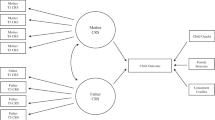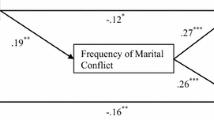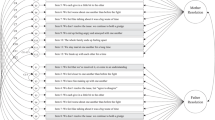Abstract
The relation of marital discord to the behavior problems of children was examined through a meta-analysis of the results of prior research. The sample comprised all published studies through 1988 that met criteria for the metaanalysis and that could be located through a combined computer and hand search of the literature. Marital discord included conflict, disharmony, and lack of agreement between currently married parents. Child behavior problems were defined as conduct problems, excluding internalized difficulties, such as anxiety. Four hypotheses were drawn from recent reviews of studies on this topic: The relation between marital conflict and child behavior problems will be (1) positive overall and will be stronger (2) for boys than for girls, (3) for cases based entirely on parent self-report data than for cases involving external sources of data, (4) for clinic than for nonclinic families. Results supported the first three hypotheses. Little evidence was found for an association between marital conflict and the behavior problems of girls. Findings are discussed in terms of their methodological and theoretical implications and in relation to a recent review of research on sex differences in children's reactions to divorce.
Similar content being viewed by others
References
Achenbach, T. M., & Edelbrock, C. S. (1978). The classification of child psycho-pathology: A review and analysis of empirical efforts.Psychological Bulletin, 85, 1275–1301.
Achenbach, T. M., & Edelbrock, C. S. (1981). Behavioral problems and competencies reported by parents of normal and disturbed children aged 4 through 16.Monographs of the Society for Research in Child Development 46(1, Serial No. 188).
Cohen, P. (1980). Effectiveness of student-rating feedback for improving college instruction: A meta-analysis of findings.Family Process, 26, 341–357.
Dadds, M. R. (1987). Families and the origins of child behavior problems.Family Process, 26, 341–357.
Emery, R. (1984). Interpersonal conflict and the children of discord and divorce. In D. H. Olson & B. C. Miller (Eds.),Family studies review yearbook (Vol. 2, pp. 310–330). Beverly Hills: Sage.
Framo, J. L. (1975). Personal reflections of a therapist.Journal of Marriage and Family Counseling, 1, 15–28.
Glass, G. V., McGaw, B., & Smith, M. L. (1981).Meta-analysis in social research. Beverly Hills: Sage.
Locke, H. J., & Wallace, K. M. (1959). Short marital adjustment and predictions tests: Their reliability and validity.Marriage and Family Living, 21, 251–255.
Margolin, G. (1981). The reciprocal relationship between martial and child problems. In J. P. Vincent (Ed.).Advances in family intervention, assessment and theory (pp. 131–182). Greenwich, CT: JAI Press.
Mintz, J. (1983). Integrating research evidence: A commentary on meta-analysis.Journal of Consulting and Clinical Psychology, 51, 71–75.
Minuchin, S. N. (1974).Families and family therapy. Cambridge, MA: Harvard University Press.
Minuchin, S. N., & Fishman, C. H. (1981).Family therapy techniques. Cambridge, MA: Harvard University Press.
O'Leary, K. D. (1984). Marital discord and children: Problems, strategies, methodlogies, and results. In A. Doyle, D. Gold, & D. S. Moskowitz (Eds.),Children in families under stress, new directions for child development (pp. 35–46). San Francisco: Jossey-Bass.
O'Leary, K. D., & Emery, R. E. (1984). Marital discord and child behavior problems. In M. D. Levine & P. Satz (Eds.),Middle childhood: Development and dysfunction (pp. 345–363). Baltimore: University Park Press.
Porter, B., & O'Leary, K. D. (1980). Types of marital discord and child behavior problems.Journal of Abnormal Child Psychology, 8, 287–295.
Quay, H. C. (1977). Measuring dimensions of deviant behavior: The behavior problem checklist.Journal of Abnormal Child Psychology, 5, 277–287.
Quay, H. C., & Peterson, D. R. (1987).Manual for the Revised Behavior Problem Checklist. Coral Gables, FL: Authors.
Rosenthal, R. (1984a).Meta-analytic procedures for social research. Beverly Hills: Sage.
Rosenthal, R. (1984b). A simple, general purpose display of magnitude of experimental effect.Journal of Educational Psychology, 74, 166–169.
Rosenthal, R., & Rubin, D. B. (1982). A simple, general purpose display of magnitude of experimental effect.Journal of Educational Psychology, 74, 166–169.
Strube, M. J., & Hartman, D. P. (1983). Meta-analysis: Techniques, applications, and functions.Journal of Consulting and Clinical Psychology, 51, 14–27.
Wampler, K. S. (1983). Bringing the review of literature into the age of quantification: A metaanalysis as a strategy for integrating research findings in family studies. In D. H. Olson & B. C. Miller (Eds.),Family studies review yearbook (Vol. 2, pp. 159–174). Beverly Hills: Sage.
Wilson, G. T., & Rachman (1983). Meta-analysis and the evaluation of psychotherapy outcome: Limitations and liabilities.Journal of Consulting and Clinical Psychology, 51, 54–64.
Wolf, F. M. (1986).Meta-analysis: Quantitative methods for research synthesis. Beverly Hills: Sage.
Zaslow, M. J. (1988). Sex differences in children's response to parental divorce: 1. Research methodology and postdivorce family forms.American Journal of Orthopsychiatry, 58, 355–378.
Zaslow, M. J. (1989). Sex differences in children's response to parental divorce: 2. Samples, variables, ages, and sources.American Journal of Orthopsychiatry, 59, 118–140.
Author information
Authors and Affiliations
Rights and permissions
About this article
Cite this article
Reid, W.J., Crisafulli, A. Marital discord and child behavior problems: A meta-analysis. J Abnorm Child Psychol 18, 105–117 (1990). https://doi.org/10.1007/BF00919459
Revised:
Issue Date:
DOI: https://doi.org/10.1007/BF00919459




